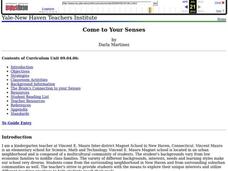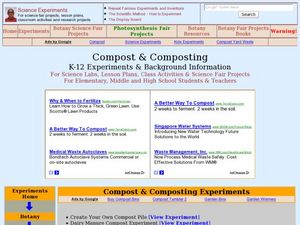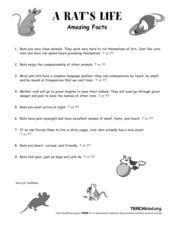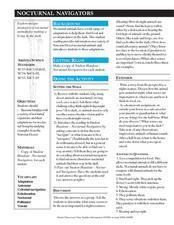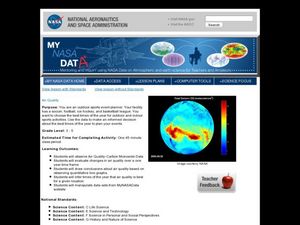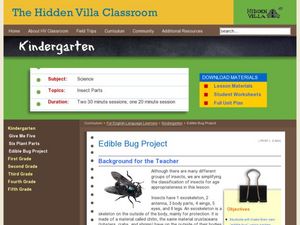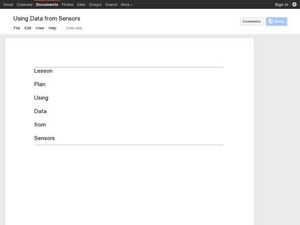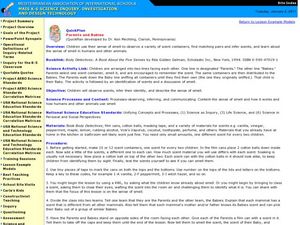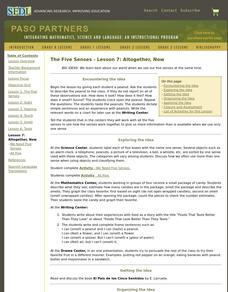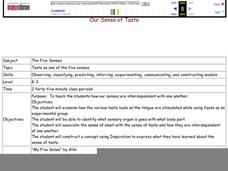Curated OER
Observing and Discovering Using Our Senses
Third graders decide if it is possible to identify something using only the senses of taste, smell and hearing. They listen to a CD of animal sounds with their eyes closed and attempt to identify the animal. Next, they smell an air...
Curated OER
Senses Used to Observe Matter
In this senses worksheet, students will complete a graphic organizer by writing in the 5 senses: sight, hearing, taste, touch, and smell.
Curated OER
Come to Your Senses
Students explore their senses. In this biology lesson plan, students will learn about their senses, what affects them, and how the brain works to control our senses in a series of lab activities.
Curated OER
Ice Cream Toppings
Students explore the five senses. In this senses lesson, students use their senses to top their ice cream. Students compare and contrast the different toppings and write their observations, using descriptive words, in a notebook.
Curated OER
Compost and Composting Experiments
Students investigate the composting process through a variety of experiments. In this ecology instructional activity, students discuss the benefits of composting. They examine how compost affect plant growth.
Curated OER
Senses
In this early childhood senses worksheet, learners match the words sight, touch, hear, taste, and smell to the appropriate body parts.
Curated OER
A Rat's Life
Here is a two-page activity on rats and mice. Learners answer nine true/false questions about rats and mice, then compose answers to seven short-answer questions about these two rodents. Finally, they must compose a fictional story about...
Curated OER
Fun With Chemical Changes
Looking for a terrific chemistry lesson for your 5th graders? This one could be for you! After a teacher-led demonstration, learners are broken up into groups and perform an experiment using cabbage juice, water, window cleaner, and...
Captain Planet Foundation
Sorting Out Soils
Sift through soil and learn about why it's important for organic processes. After discussing what makes up soil, such as the living organisms and what types of soil have more nutrients, kids sample layers of mulch and deeper soil to...
Washington Office of Superintendent of Public Instruction
Using Our Senses to Observe
Look around and explore. Little ones use their five senses with some day-to-day activities designed to guide observation and apply STEM strategies. Young scientists learn through comparing/contrasting and observing with magnifiers as...
Desert Discoveries
Nocturnal Navigators
Young biologists take a look at some of the unique ways that nocturnal animals survive in the dark. After reading a terrific student handout which is embedded in the plan, learners work together to answer questions about what they have...
Curated OER
What is your Air Quality?
In this air quality worksheet, students use the EPA's Six Common Air Pollutants web site and the AIRNow web site to answer 9 questions about common air pollutants, how pollution affects people and the environment, how pollutants are...
Curated OER
Air Quality
Learners observe air quality and monoxide data. In this air quality lesson, students draw conclusions and manipulate data from a one year period on changes in air quality.
Curated OER
Edible Bug Project
Students recognize the characteristics of insects. In this edible bugs lesson, students observe the body parts of an insect. Students create an edible insect using a grape, carrot sticks and sorrel stems and leaves. Students share the...
Curated OER
States Of Matter
Delv into the states of Matter. Students engage in the scientific inquiry process to uncover the exciting world of Matter. They watch a series of videos, and conduct experiments in order to collect and analyze data on the various state...
Curated OER
Using Data from Sensors
Beginning with a discussion about using technology to collect data, this resource includes a video about the next Mars rover as an example. Young scientists are taught that filtering is necessary before collected data can be analyzed....
K12 Reader
Adapting to Survive
Life science and language arts come together in a passage about animal adaptation. After kids learn about how organisms adapt to conditions in their environments, they complete five reading comprehension questions based on context clues...
Curated OER
The Five Senses
Pupils explore and study about the five senses. They focus on their sense of smell and interact with certain ingredients, including white vinegar. Each student also helps to create and share a concept map on the sense of smell utilizing...
Curated OER
Parents and Babies
Students examine different scents. In this science lesson, students are divided into being parents or babies and are each given a scent. The "parents" have to identify or infer the scent of their "baby" showing that every mammal has a...
Curated OER
Altogether, Now
Learners apply their five senses to science, math, drama, and writing center activities.
Curated OER
The Five Senses
Learners use their senses to identify a variety of items in mystery boxes after listening to a read aloud of Aliki's, "My Five Senses." They taste and smell items to identify them before completing a Senses Literature Log. They label the...
Curated OER
Lesson Plan One: Introduction to the Five Senses
Students listen to book See, Hear, Touch, Taste, Smell, by Melvin Berger, and explore five senses and sense organs
Curated OER
Salmon Homing Instincts
Young scholars role-play salmon returning to original streams using their sense of smell like the salmon do. They smell cinnamon, vanilla and peppermint on cards and follow that scent to locations in the classroom that represent their...
Curated OER
Our Sense of Taste
Students explore the relationship between the senses of taste and smell using a blindfold taste test. In partners, they taste different foods with their noses plugged and unplugged. They create a life size outline of the human body to...




